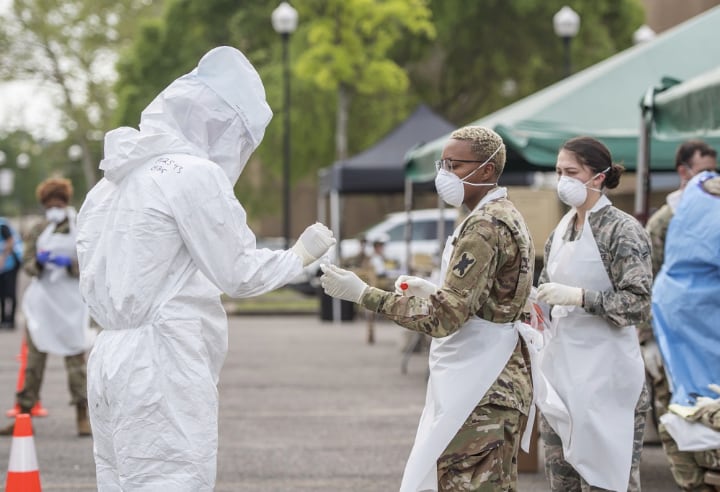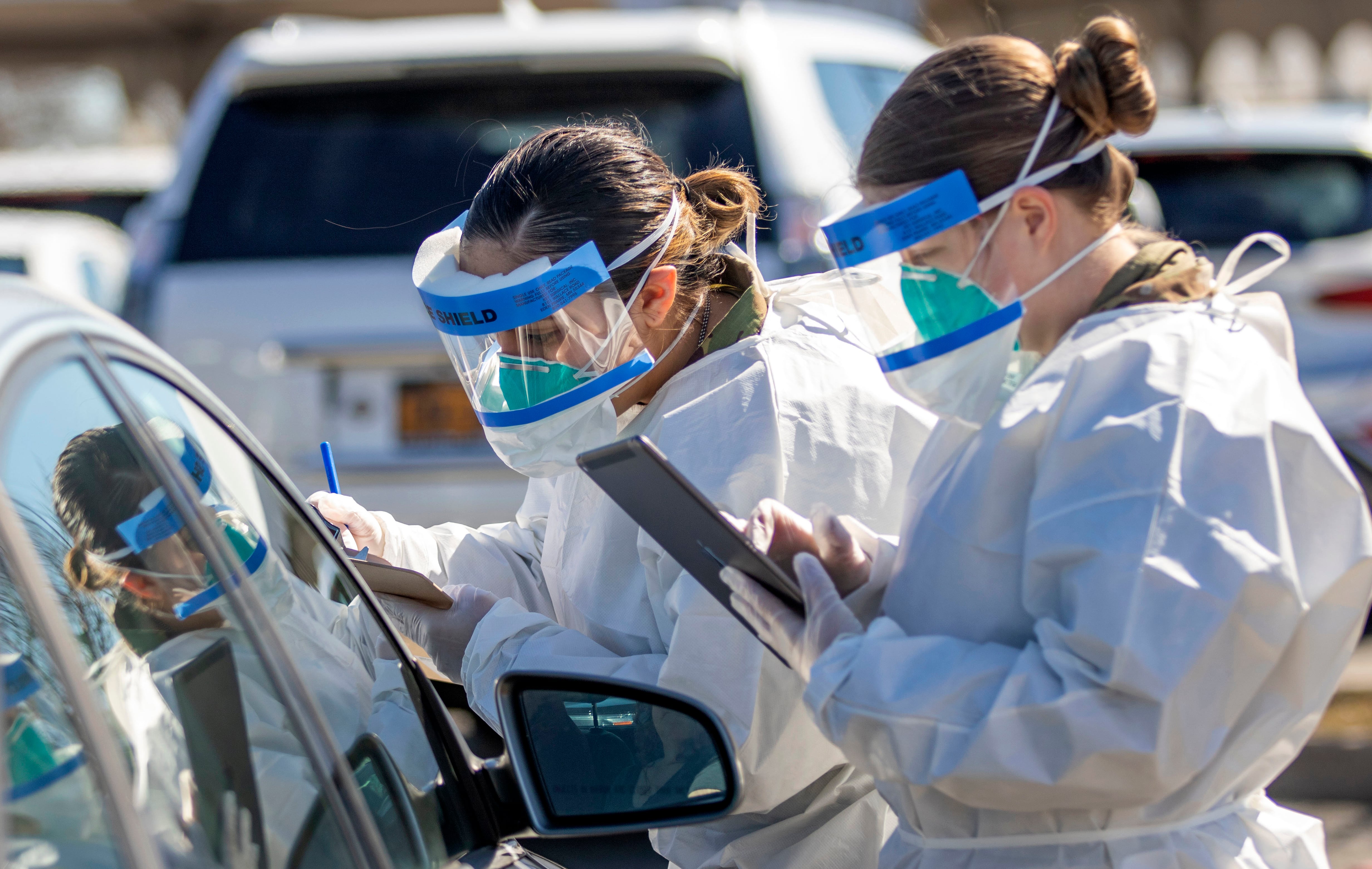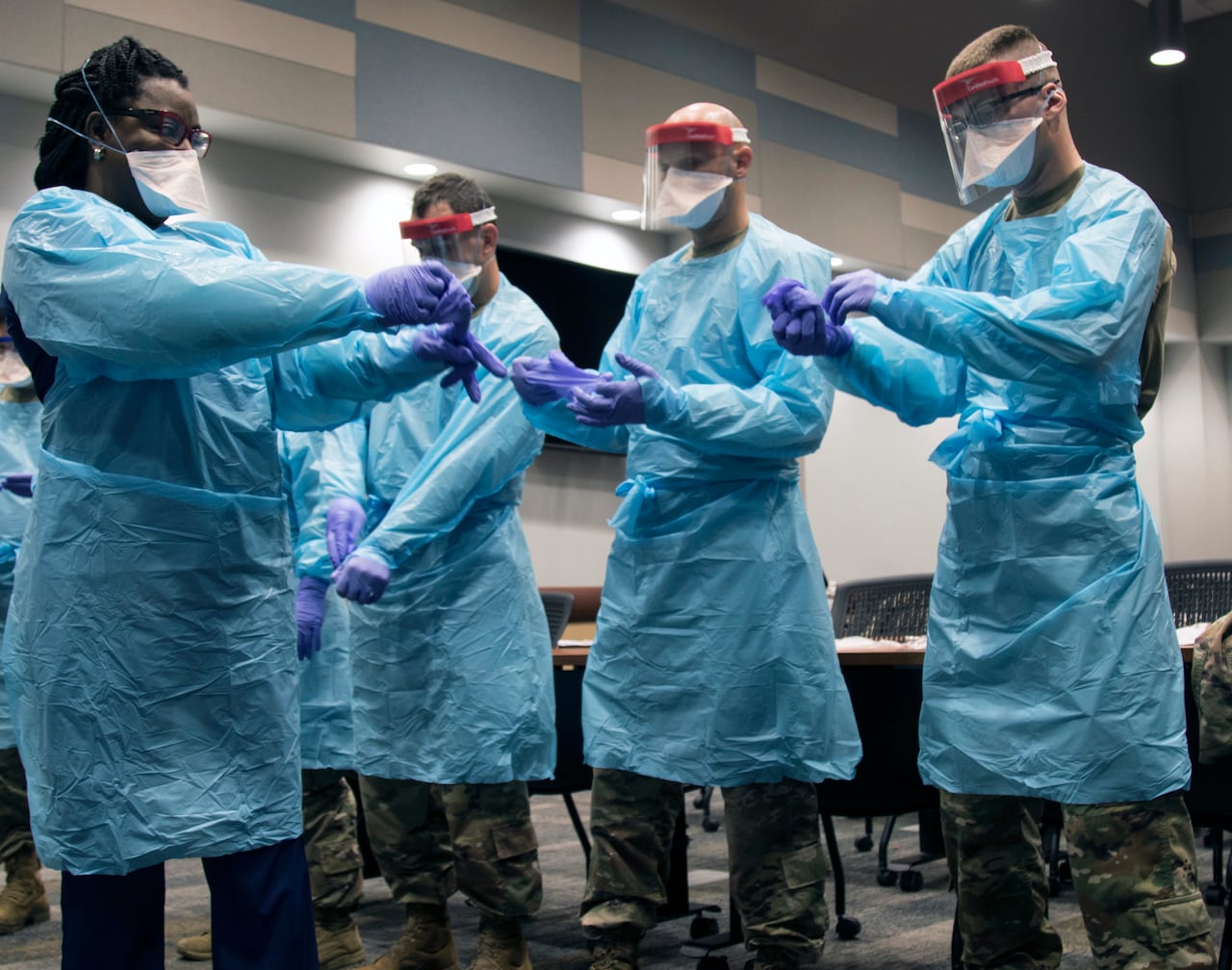The number of Guard troops mobilized in the effort to cope with the coronavirus pandemic continues to grow.
As of Sunday morning, more than 14,830 Air and Army National Guard professionals are supporting the COVID-19 crisis response at the direction of their governors.
That’s an increase of more than 200 Guard troops since Sunday.
In addition, 22 states and two territories have approved use of Dual-Status Commanders.
Governors across all 50 states, Puerto Rico, Guam, the U.S. Virgin Islands and Washington D.C. have each mobilized components of their Army and Air National Guard to assist in their state’s response to the COVID-19 pandemic.
“This response isn’t just about delivering food or supporting COVID test centers. It’s about protecting our children, parents and grandparents," said Air Force Gen. Joseph Lengyel, Chief, National Guard Bureau. “Our nation is looking to the National Guard to help and we can’t let them down.”
On March 27, Secretary of Defense Secretary Mark T. Esper modified and accelerated the process by which the Department of Defense authorizes the use of National Guard forces under Title 32 Section 502(f). The modification creates a conditional pre-authorization in response to Federal Emergency Management Agency requests that ensures quicker federal funding for state National Guard forces mobilizing to aid in whole-of-government COVID-19 response efforts.
“This authorization enables [governors] timely use of the National Guard to save lives and protect public health and safety," Esper said in a March 27 letter to each governor. “The men and women of the National Guard are Citizen-Soldiers who stand ready to serve their communities as we fight COVID-19.”
National Guard support focuses on supporting a wide variety of mission sets ranging from community-based testing sites and creating enhanced medical capacity, to facilitating logistical support.
National Guard support focuses on supporting community based testing sites and creating enhanced medical capacity. Guard officials once again repeated that this is not an effort to enforce martial law.
“We are here to protect our communities, not police them," said Lt. Gen. Daniel R. Hokanson, Director of the Army National Guard .
RELATED

Last week, President Donald Trump ordered Guard troops in New York, California and Washington be placed under Title 32 status, meaning states maintain control, but the federal government picks up the tab.
RELATED

Lengyel told reporters last week that he expects more governors to seek that status, as it helps speed up the mobilization process and provides better benefits for the troops.
On March 28, Trump approved Title 32 requests from Florida, Guam, Louisiana, Massachusetts, Maryland, New Jersey and Puerto Rico. They join New Jersey and the first three states to receive that status, according to Army Master Sgt. W. Michael Houk, a National Guard spokesman.
In addition, Houk said coordination is ongoing between the Pentagon, FEMA and the states/territories for Florida, Guam, Louisiana, Puerto Rico, Massachusetts and Maryland.
Current National Guard COVID-19 response missions include, but are not limited to:
*Full time 24 hour state Emergency Operations Center staffing to synchronize National Guard efforts with local and state mission partners to plan and execute an effective response;
*Working with the U.S. Army Corps of Engineers to increase medical capacity;
*Supporting warehouse operations and logistics efforts to help deliver critical supplies;
*Delivering food in hard-hit communities;
*Manning call centers to be a knowledgeable and calming voice.
*Providing critical Personal Protective Equipment training and delivery to civilian first responders;
*Performing sample collection and delivery to medical personnel;
*Providing support and symptoms screening to testing facilities and passenger terminals;
*Providing transportation and assessment support to healthcare providers.
In addition, Guard missions also include Weapons of Mass Destruction - Civil Support Teams (WMD-CSTs), Personal Protective Equipment (PPE) training and sample collection; response planners; support to medical testing facilities; response liaisons and support to state Emergency Operations Centers; support to healthcare professionals - assessments, transportation; logistics support; assisting with disinfecting/cleaning of common public spaces; providing transportation support for health care providers; collecting and delivering samples; and assisting with sample administration.
“We expect multiple states to use their WMD-CSTs to assist in sample collection, donning and doffing PPE techniques and decontamination techniques,” said Lt. Col. Jennifer Cope, Chief, National Guard Bureau Weapons of Mass Destruction Program Office
The National Guard Bureau (NGB) on the federal level assists in “synchronization” and planning between the states, and their coordination center is a “24/7 operation working at increased capacity in anticipation of COVID-19 requirements,” the bureau said.
“

Here are the latest updates of National Guard actions across the United States:
Florida
The Florida National Guard has 1,558 men and women activated in support of COVID-19 efforts. Support includes, but is not limited to providing operational support of Community Based Testing Sites; augmentation to airport screening measures; and statewide logistics support, coordination, planning and operational mission sets, according to 1st Lt. Tahisha Coleman, a spokeswoman.
To date, Guard personnel have assisted in the testing of over 13,400 individuals for the COVID19 virus. Additional testing sites will be stood up in Palm Beach County and is projected to go operational tomorrow.
The Florida National Guard continues to support the Florida Department of Health and airport authorities in application of the Governor’s order to conduct screenings at airports in Miami, Fort Lauderdale, Tampa, Orlando, Jacksonville, Palm Beach International, and Fort Myers. These missions will support the Governor’s recent travel ban guidance in an attempt to significantly reduce the number of infected individuals entering the state from areas with a high amount of community spread.
The state Department of Health continues to supply the required personal protective equipment enabling Guard men and women to conduct the support requirements.
The Florida National Guard have activated medical professionals, Army Combat Medic Specialists, and Air Force Medical Technicians in support of the Florida Department of Health’s Community Based Testing Sites. Guard personnel are on site and have formed Task Force Medical.
Guard personnel have been activated to augment the State Logistics Readiness Center, the State’s Logistics Branch, as well as facilitate statewide logistics needs of the Guard formations on mission. Logistics professionals continue to support the State’s Emergency Operations Centers, as well as sustain the mobilized personnel. Guard personnel performing duties at the logistics readiness center have to be screened twice daily and receive temperature checks.
Florida Guard men and women will augment the State Emergency Operations Center and local emergency management offices across the state.
Hawaii
The Hawaii National Guard is continuing to support the state’s response to COVID-19 with more than 100 Soldiers and Airmen on State Active Duty (SAD) status.
Air National Guard members, from Medical Detachment 1, provided logistical support with personal protective equipment (PPE), and maintenance of valuable medical equipment at the Hawaii Healthcare Emergency Management Coalition facilities. The PPE will be distributed to multiple Hawaii medical facilities facing an equipment shortage due to COVID-19 pandemic.
The Hawaii Healthcare Emergency Management Coalition is a statewide, federally-qualified, allhazards comprehensive emergency management program whose mission is to sustain and maintain essential and critical healthcare system services statewide during a major emergency or disaster.
Along with logistics and organizing distribution, Guard members also took inventory of the medical supplies on-hand.
Iowa
Iowa National Guard activates regional support group and continues COVID-19 response efforts with the activation of approximately 75 soldiers from the 734th Regional Support Group, based at Camp Dodge in Johnston, on March 27.
Additionally, soldiers assigned to the Headquarters and Headquarters Detachment of the 734th Regional Support Group and its subordinate units, the 1034th Combat Sustainment Support Battalion, out of Camp Dodge, and the 1133rd Transportation Company, out of Mason City, will provide additional logistical and transportation assets to the fight against COVID-19.
The Iowa National Guard continues deliveries of vital medical personal protective equipment to more than 20 distribution sites. In conjunction with the Iowa Department of Homeland Security and Emergency Management, soldiers delivered approximately 32 pallets to 23 county distribution centers, bringing the total distribution of 166 pallets to more than 75 counties across the state since distribution missions began March 24.
In addition, eight soldiers from the 186th Military Police Company, out of Camp Dodge, delivered and assembled two tents to the Central Iowa Veterans Administration Healthcare System in Des Moines Friday. These tents will be used to help screen those entering the hospital for COVID-19.
Currently there are now more than 120 Soldiers and Airmen on duty supporting a variety of COVID-19 response missions across the state.
New York
As of today, the New York National Guard has 2,700 personnel on mission across the state. This includes members of the New York Army and Air National Guard, the New York Guard (State Defense Force), and the New York Naval Militia.
Six Joint Task Forces are operating on Long Island, New York City, the Hudson Valley, Capital Region, Syracuse and Buffalo to support state and local governments.
In New York City, Guard personnel continue to support the arrival of patients at the Jacob Javits Center FEMA field hospital.
About 600 U.S. Army medical personnel from Fort Campbell, Ky., and Fort Hood, Texas, arrived this past weekend and will staff the center for patient treatment.
A New York National Guard mayor’s cell and other soldiers will continue supporting the 320 federal personnel, who are managing the site as the unified command post for multi-agency response at the Javits Center.
New York has established a dual-status commander, Army Brig. Gen. Michel Natali, New York National Guard, Assistant Adjutant General.
The New York National Guard continues to support seven drive-thru testing sites. Six sites are located at SUNY Stony Brook, Jones Beach State Park, Staten Island, Glen Island State Park in Westchester County, the Anthony Wayne Service area in Rockland County, and Lehman College in the Bronx.
An additional site opens today at Coop City - Bay Plaza Mall in the Bronx. The New York National Guard will assist in staffing that location with soldiers and medical personnel.
New York National Guard personnel are continuing to support food packaging and distribution today in the Bronx, Brooklyn, Queens, and Staten Island.
Similar missions resume today in Westchester County in New Rochelle and Albany County for the City of Albany.
New York soldiers and airmen are also conducting logistics missions in support of the state response, including warehousing support and bulk distribution at sites in the Hudson Valley, the Albany area, and the Mohawk Valley.
Hand sanitizer warehousing and deliveries continue today across the lower Hudson Valley.
New York National Guard also continues to provide support to the New York State Coronavirus Hotline by working in a call center in Rotterdam, N.Y. offering updated information to the public. Other soldiers support a call center mission in Brooklyn and New York City.
Soldiers are also on call to assist Department of Health officials at the Wadsworth Laboratory in Albany for packaging COVID 19 test kits.
Pennsylvania
Over the weekend, 25 Pennsylvania National Guardsmen on state active duty provided logistical assistance to FEMA at the Glen Mills School as they unloaded federal equipment to establish a federal medical station.
Federal, state and local assets are coming together to open this facility which can house non-COVID 19 patients with less severe conditions if and when regional hospitals become full.
The Soldiers are from the 103rd Engineer Battalion, a unit which traces its origins to the Associators, constituted in 1747 in Philadelphia by Benjamin Franklin. They spent two days unloading trucks, unpacking boxes and setting up beds.
“We were one part of a team of teams coming together to support the local community,” said Maj. Joseph D. Martinkis, commander of the 103rd Engineer Battalion. “Being able to work alongside these civilian authorities is part of the diverse skill set held by our National Guardsmen.”
West Virginia
Currently, nearly 350 members of the West Virginia National Guard (WVNG) are serving the State of West Virginia by augmenting civil authorities through four lines of effort:
*Operationalizing of the event
*Stabilization of the population
*Logistical movement of critical supplies
*Information and analytics to combat the virus
“The WVNG continues to make significant headway in positioning our state for a robust response,” said Maj. Gen. James Hoyer, the Adjutant General of the WVNG. “Our men and women are showcasing the innovation, determination and driving spirit of our force in their actions to assist the State of West Virginia each and every day.”
Through continuous partnerships with our State Board of Education, community and technical colleges and business partners, a prototype N95 mask has been developed that is being refined in order to meet the specifications for the medical community. Collectively, we are also looking into innovative ways to meet the in-demand needs of our West Virginia healthcare system to include providing retail-specific training on proper box handling and PPE training for our medical and first responder community.
Since the last update, the WVNG logistical element has provided delivery of seven refrigerated trailers to areas around the state that will support feeding missions in Webster, Clay, Lincoln, Braxton, Pocahontas and Ritchie Counties. Additionally, two other missions were conducted to support distribution of 15,000 pre-packaged meals from Tamarack to Mountain View Elementary in Union and Peterstown Elementary in Peterstown. Ten additional soldiers began working with the Facing Hunger Food Bank in Huntington today and will work seven days a week assisting with food box preparation and distribution.
To date, the WVNG has received 7,045 gloves; 330 gowns; 31,200 surgical masks; 1,560 N95 masks and 139 coveralls from the national stockpile. Additional shipments are expected in the next 24 hours and the WVNG will facilitate the distribution of these supplies to healthcare facilities around the state alongside the West Virginia Department of Health and Human Resources (WVDHRR) and the West Virginia Division of Homeland Security and Emergency Management (WVDHSEM).
Beginning tomorrow, the WVNG will provide proper cargo and box handling training to big box retail establishments in the area, with a plan to roll out additional training to restaurants and convenience stores. In Huntington, four Guard personnel will assist with traffic control at a drive through testing site beginning Tuesday.
This story will continue to be updated as the National Guard Bureau releases daily reports on National Guard activities nationwide. If you or someone you know has been called up to State Active Duty status, please contact Military Times managing editor Howard Altman, haltman@militarytimes.com, if you are interested in sharing about your experience.
Howard Altman is an award-winning editor and reporter who was previously the military reporter for the Tampa Bay Times and before that the Tampa Tribune, where he covered USCENTCOM, USSOCOM and SOF writ large among many other topics.



